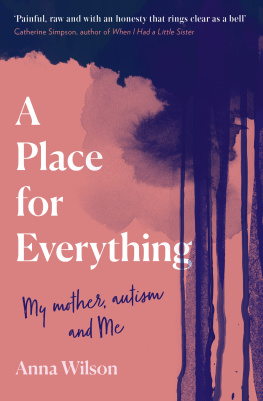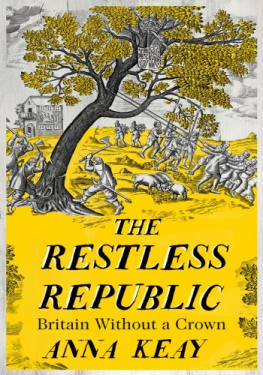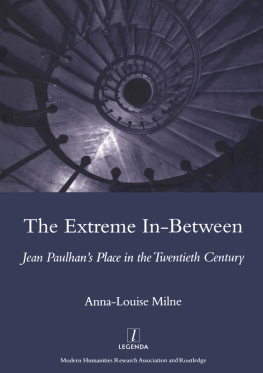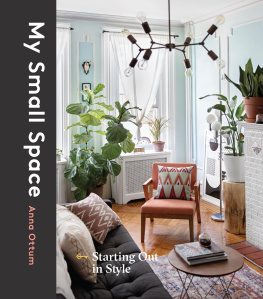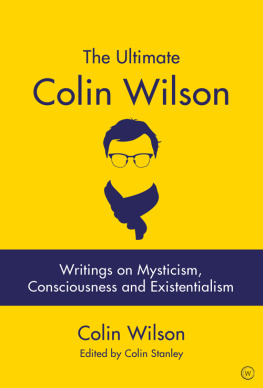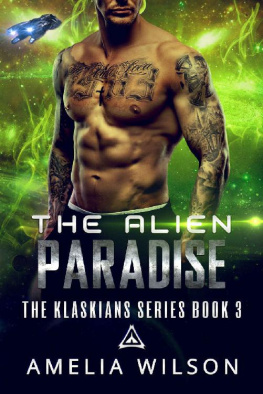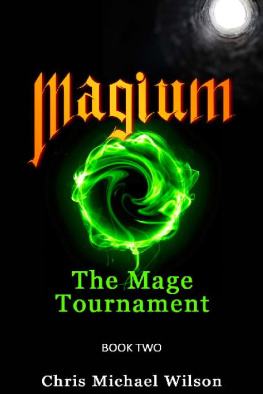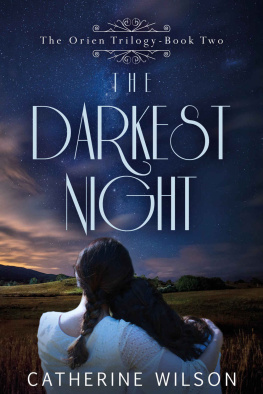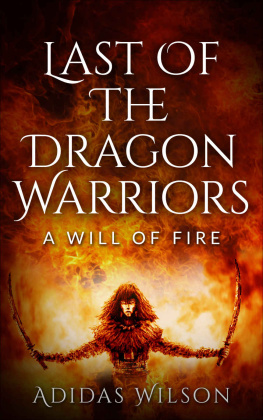Anna Wilson - A Place for Everything
Here you can read online Anna Wilson - A Place for Everything full text of the book (entire story) in english for free. Download pdf and epub, get meaning, cover and reviews about this ebook. year: 2020, publisher: HarperCollins Publishers, genre: Science fiction. Description of the work, (preface) as well as reviews are available. Best literature library LitArk.com created for fans of good reading and offers a wide selection of genres:
Romance novel
Science fiction
Adventure
Detective
Science
History
Home and family
Prose
Art
Politics
Computer
Non-fiction
Religion
Business
Children
Humor
Choose a favorite category and find really read worthwhile books. Enjoy immersion in the world of imagination, feel the emotions of the characters or learn something new for yourself, make an fascinating discovery.
- Book:A Place for Everything
- Author:
- Publisher:HarperCollins Publishers
- Genre:
- Year:2020
- Rating:4 / 5
- Favourites:Add to favourites
- Your mark:
- 80
- 1
- 2
- 3
- 4
- 5
A Place for Everything: summary, description and annotation
We offer to read an annotation, description, summary or preface (depends on what the author of the book "A Place for Everything" wrote himself). If you haven't found the necessary information about the book — write in the comments, we will try to find it.
A Place for Everything — read online for free the complete book (whole text) full work
Below is the text of the book, divided by pages. System saving the place of the last page read, allows you to conveniently read the book "A Place for Everything" online for free, without having to search again every time where you left off. Put a bookmark, and you can go to the page where you finished reading at any time.
Font size:
Interval:
Bookmark:
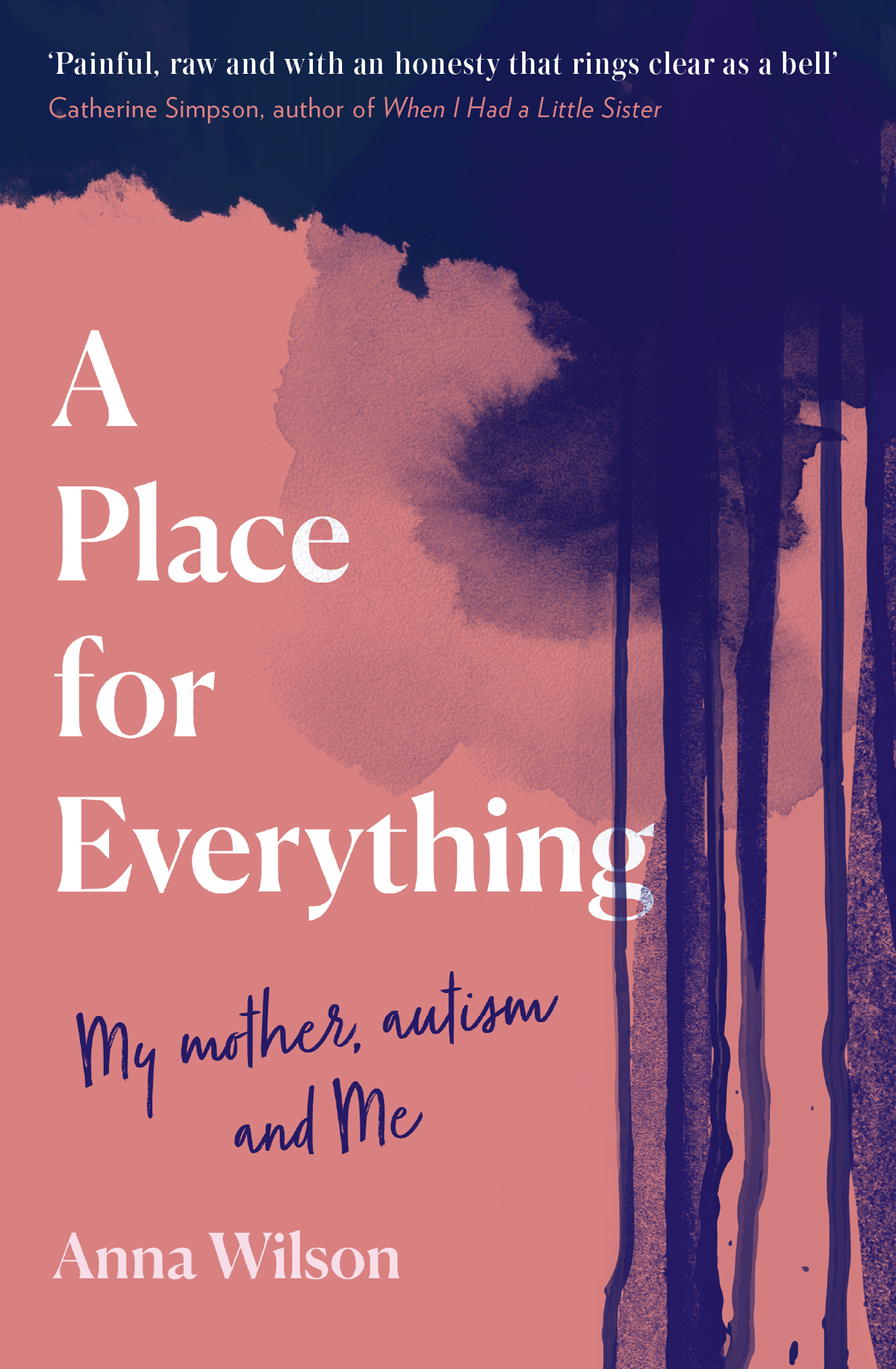


An imprint of HarperCollins Publishers Ltd
1 London Bridge Street
London SE1 9GF
First published in Great Britain by HQ in 2020
Copyright Anna Wilson 2020
Anna Wilson asserts the moral right to be identified as the author of this work.
A catalogue record for this book is available from the British Library.
All rights reserved under International and Pan-American Copyright Conventions. By payment of the required fees, you have been granted the non-exclusive, non-transferable right to access and read the text of this e-book on-screen. No part of this text may be reproduced, transmitted, downloaded, decompiled, reverse engineered, or stored in or introduced into any information storage and retrieval system, in any form or by any means, whether electronic or mechanical, now known or hereinafter invented, without the express written permission of HarperCollins.
Ebook Edition June 2020 ISBN: 9780008342548
Version 2020-06-15
This ebook contains the following accessibility features which, if supported by your device, can be accessed via your ereader/accessibility settings:
- Change of font size and line height
- Change of background and font colours
- Change of font
- Change justification
- Text to speech
- Page numbers taken from the following print edition: ISBN 9780008342531
To Dad and Mum ad astra cinis
Omnia vincit amor, et nos cedamus amori
Love conquers all; let us, too, yield to love
Virgil, Eclogues 10:69
I s it Aspergers or autism or what is it?
When it was initially put to us that Mum might have autism, the psychologist used the term Aspergers, which had been in common usage for a while. When writing this book, I came across many different terms for people with autism and quickly realised that, whatever the accepted clinical terminology at any given time, individuals will have their own preferences. I have tried to stick to the terms used in quoted text; for this reason there may seem to the reader to be certain discrepancies throughout.
Many people with autism who would be described as high-functioning (in that they have a high intelligence and can, in the main, function well in society) prefer to be referred to as someone with Asperger syndrome or with Aspergers, as they say that this easily identifies them at that particular end of the autistic spectrum. One friend said, The minute you say autism, people have this set of assumptions, like Oh dear does she sit in the corner of the room rocking back and forth and not speaking? Thats why I say I have Aspergers. Others prefer the more blanket term autism as they feel this acknowledges that there is a spectrum within the syndrome. The DSM-5 (Diagnostic and Statistical Manual of Mental Disorders, fifth edition) uses the term autistic spectrum disorder or ASD. There is some controversy surrounding this term among people with autism. The DSM was updated as recently as 2013, so if you had been given a diagnosis before that date and had been referred to as someone with Aspergers, you might well prefer to continue using that terminology. Also, I have met many people with autism who dislike the use of the word disorder attached to them. Some therefore use ASC instead autism spectrum condition. One friend said, I consider my autism to be a syndrome, not a disorder. I feel that the word disorder is attached to people who are not coping. I am coping very well, so I dont like this word applied to me. My autism means I see the world differently from you, thats all.
I have met people too who resent the fact that autism is included in the DSM as they feel that it is not a mental illness per se mental illness may be a result of undiagnosed or unsupported autism, but it is not the cause or the general characteristic of the syndrome.
In conclusion, I have learnt that while diagnosis is extremely important in being able to access support and in helping neurotypicals (i.e. people without autism) to understand the autistic brain, it is most helpful to see the human first and to realise that a label on its own, with no support, is not going to help anyone. Hence my preference for the generic term a person with autism.
Capacity
This was another minefield into which I walked the minute I entered the bewildering world of mental health terminology. The first time someone mentioned the phrase your mother has capacity, I assumed they meant that she was capable. In other words, I thought they were referring to the fact that she could do things. It took someone in the know to explain that a person has or does not have capacity is mental-health shorthand for this person has or does not have capacity under the terms of the Mental Capacity Act 2005 to make decisions for themselves. In other words, quoting directly from the Act:
People who lack capacity
- 1.For the purposes of this Act, a person lacks capacity in relation to a matter if at the material time he is unable to make a decision for himself in relation to the matter because of an impairment of, or a disturbance in the functioning of, the mind or brain.
- 2.It does not matter whether the impairment or disturbance is permanent or temporary.
- 3.A lack of capacity cannot be established merely by reference to
- (a)a persons age or appearance, or
- (b)a condition of his, or an aspect of his behaviour, which might lead others to make unjustified assumptions about his capacity.
In my opinion, the unexplained shorthand use of such terms is extremely disempowering to patients and families who are trying to care for loved ones. I have therefore tried to unpick such terminology in the writing of this book in the hope that it will be helpful to people going through a similar situation.
Bloody kids, bloody kids, bloody, bloody, bloody kids!
M um is standing in front of the mirror in the hall. Her teeth are bared. Her eyes are wide. Her face is stretched and red. Her hair is wild. Shes staring at herself and chanting those horrible words, over and over and over again. Her fists are clenched and shes shaking them. Can she see us in the mirror too? I dont want her to.
Carrie and I are hiding by the cupboard under the stairs. We have to make ourselves as small as possible, then Mum wont see. I keep an eye on Mum through the banisters. She is still saying those words. Her voice is high and breathless. Its not her normal, Kind Mum voice. She doesnt look like our normal mum at all. Even her hair is wrong. Its as though Kind Mum has disappeared completely and been replaced by a monster. Shes holding her fists up by her face now and shaking them and shaking them. Her face is getting redder and redder. It looks as though she might explode. I cant remember what we did to make her be like this. I know it was our fault my fault. It must have been my fault because Carrie is too small to have done anything bad. Carrie never does anything bad, anyway. I know that because Mum says, Why cant you be like your sister? So it must be my fault that Mum is like this. I need Kind Mum to come back. I hold my breath and start counting. Can I bring her back if I hold my breath and count for long enough?
I also need to stay brave for Carrie. Shes crying. I want to reach out and put my arm around her, but I mustnt move. We mustnt move. Mum might hear us. We have to let her chant and shake her fists until she feels better.
Font size:
Interval:
Bookmark:
Similar books «A Place for Everything»
Look at similar books to A Place for Everything. We have selected literature similar in name and meaning in the hope of providing readers with more options to find new, interesting, not yet read works.
Discussion, reviews of the book A Place for Everything and just readers' own opinions. Leave your comments, write what you think about the work, its meaning or the main characters. Specify what exactly you liked and what you didn't like, and why you think so.

